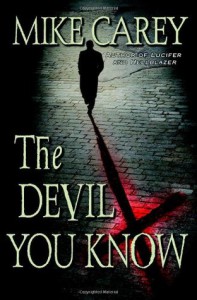

Hmm. I was pretty sure I reviewed this, but my review has disappeared. In any case, I just finished a reread, so I guess I'll use my GR review as a base and stick it up again.
~~Review After Reread~~
Despite the etymology of his name, Felix "Fix" Castor feels anything but happy or lucky. In his altered world, in which the dead have risen and now pace the streets as zombies and ghosts, Castor's skills as an exorcist are at a premium. After a terrible accident in which he helped to bind a friend's soul to a demon, Castor is trying to take early retirement from the ghostbuster business. With money tight and fear on the rise, it's just not that easy for Castor to hang up his exorcism flute. To earn a bit of much-needed cash, he takes on one last exorcism. It seems simple--a ghost in a museum who has suddenly taken to violence--but as always seems to be the case, things are never as simple as they appear. Far too soon, Castor is drawn into a web of conspiracy and brutality, with a mob boss expressing a rather sinister interest in him, a demon ready to hunt him down, and a loup-garou after his blood. Worse still, Castor is forced to question his own beliefs about life, death, and the supernatural.
Mike Carey's The Devil You Know is a compelling read, a hardboiled detective story transposed into a gritty apocalyptic world. Castor is an engaging narrator and his wry, humorous voice is effective and appealing. Take his explanation for how he got into ghostbusting:
"But how many people do you know who actually get to choose what they do for a living? My careers teacher said I should go into hotel management, so exorcism it was."
As one might expect from the title, The Devil You Know is a very dark read, without as much of the genre-savvy absurdism that tends to characterize urban fantasy. There is humour, most of it decidedly British and involving references to Thatcher and Blue Peter, but at least in my first read, I was not once tempted to laugh out loud. However, this speaks more about the underlying darkness of the plot and Carey's ability to generate suspense. On my second read, I found quite a few passages hilarious. I especially love Castor's mixed metaphors such as:
"It wasn’t what I was expecting, but like I’ve always said, if life gives you lemmings, jump off a cliff."
Most urban fantasy pits the protagonist against supernatural evils, but this book is about man's inhumanity to man, leading to a much darker, more upsetting, and more introspective book. It also calls into question many of the basic assumptions of most urban fantasy worlds. For example, in most urban fantasy novels, because most of the villains faced in urban fantasy are nonhuman, removing them becomes a righteous act. It is taken for granted that vampires don't have souls so a stake through the heart isn't murder, that since souls are just residual carbon copies, a salt-and-burn operation at a graveside is just a guilt-free janitorial exercise, that the creature being hunted is a monster and removing a monster is a moral act. But in Felix Castor's case, the greatest monsters are the other people. Even loup-garou are people in some ways, since they are ghosts possessing animal bodies, and it is the human intelligence that makes them vicious. What happens to an exorcised ghost is unknown. Is he damning the souls of those dead, or releasing them to a better hereafter? That open question makes the tone of the novel very gritty and saturnine, but also creates a complex and compelling world.
The overall feel of the novel is very noir hardboiled detective; we have the standard mob boss and femme fatale plot arcs and quite a reasonable mystery. At the same time, the perpetrator becomes pretty obvious about halfway through, and waiting for the naive Felix to catch up is frustrating. In Castor's world, it is humanity, not supernatural monsters, who are the root of all evil, leading to a plot that at times feels unrelentingly dark. Mike Carey also goes out of his way to castigate the Church as rigid and hypocritical. I'm no longer Christian--I misplaced my faith and it hasn't yet turned up in the lost and found--but even I was appalled at the vitriol applied to the religion. Castor has the jaded world-weariness of a true hardboiled detective, but unlike "protagonists" such as Richard Kadrey's James Stark, he has not caved into self-serving nihilism. Felix still believes in right and wrong and wants to do the right thing with an almost painful intensity. What makes this book such a dark and compelling read is that it is simply not always easy to figure out, in a complex and twisted world, exactly what constitutes the moral act.
Overall, The Devil You Know combines some of the best aspects of urban fantasy with the mood and structure of classic noir. Castor is an appealing narrator, a satisfyingly imperfect protagonist in a world of gritty greys. The book is an intriguing start to a great series. The Felix Castor books only get better from here.

 15
15




